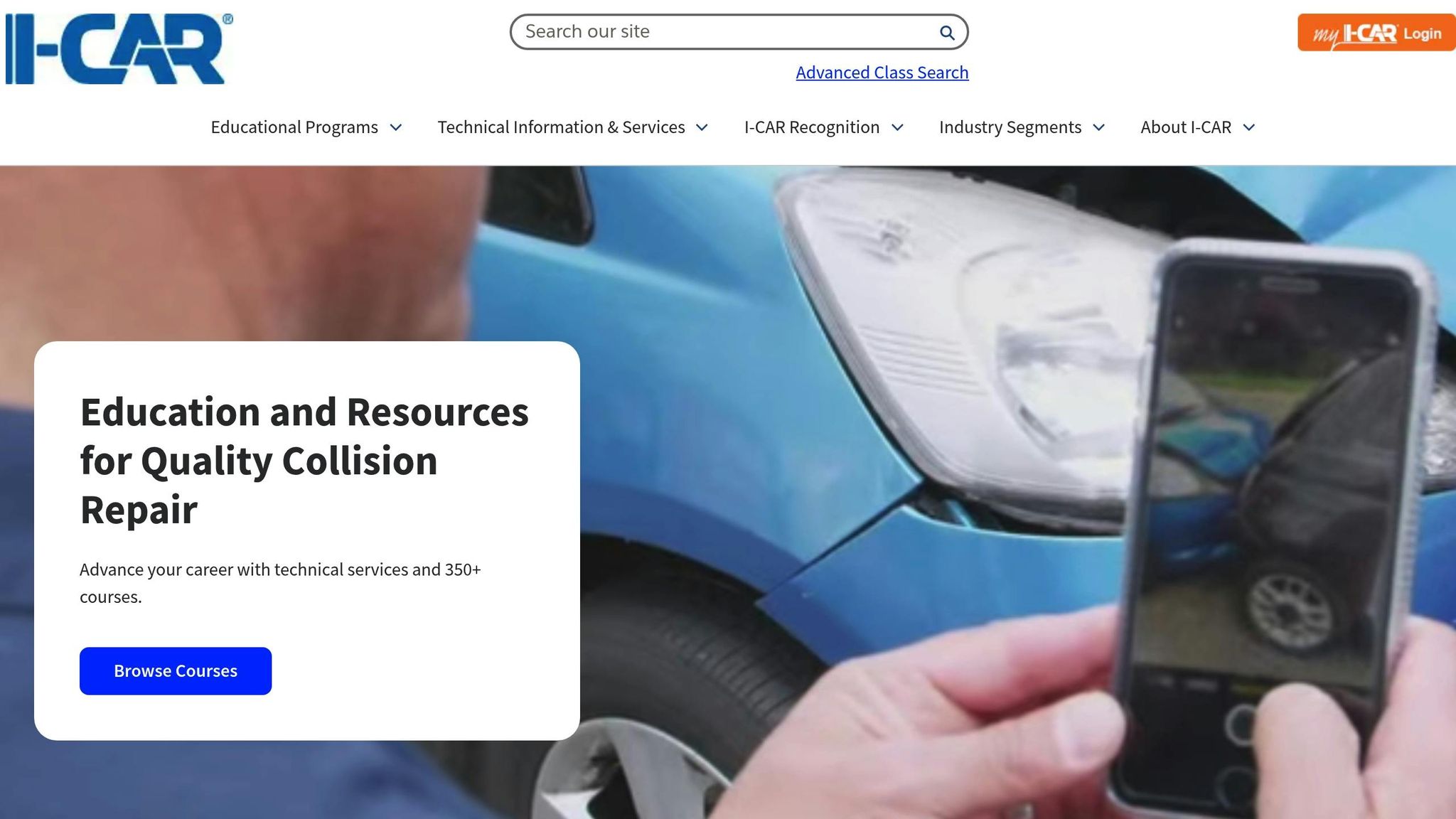August 10, 2025

When it comes to car repairs, asking the right questions before getting a quote can save you money, time, and frustration. Here's what you need to know:
Knowing how auto body estimates are structured can help you avoid unexpected charges and make smarter choices when comparing repair shops. A typical auto body repair estimate includes details about parts, labor, and taxes - all broken down for clarity.
The first thing you'll notice on any estimate is the cost of parts. This section should state whether the shop plans to use OEM (Original Equipment Manufacturer) parts or aftermarket alternatives. OEM parts are designed to match your vehicle's original specifications, while aftermarket parts can often save you money but may vary in quality.
Next up are labor charges, which usually make up a significant portion of the estimate. In Idaho, for example, labor rates can range from $50 to $100 per hour, depending on the shop’s expertise and location. A good estimate will show both the hourly rate and the number of hours required for each repair task. This transparency allows you to compare estimates from different shops with confidence.
Paint and materials costs cover everything needed to refinish your car, from primer and base coat to clear coat and other finishing supplies. If multiple panels need work, these costs can quickly add up.
Don’t overlook taxes and fees. While some shops include these in their initial quotes, others may not. Idaho sales tax applies to auto body repairs, and additional fees for things like waste disposal, shop supplies, or administrative tasks might also appear. Always confirm whether these charges are included to avoid surprises when you get the final bill.
Another factor to consider is supplements - extra costs that come up if hidden damage is found during repairs. For instance, damage to internal components might not be visible until the repair process begins. Shops are required to communicate these changes, explaining why the additional costs are necessary.
Modern shops often rely on computerized measurement tools for precise estimates, especially for structural repairs or frame alignment. However, even with advanced tools, some damage might only be discovered during disassembly, which is why estimates often include a note about potential cost adjustments.
A detailed, itemized estimate is essential for transparency. It breaks down every charge, showing exactly what you're paying for. In some states, like California, regulations require that estimates specify the job and list prices for all parts and labor, with each part identified as new, used, rebuilt, or reconditioned.
For added convenience, some shops now provide mobile estimate services, where a technician comes to you to assess the damage and give an estimate. This can be especially helpful if your car isn’t drivable or if you’re short on time.
Finally, pay attention to how the shop handles insurance coordination. Some shops work directly with insurance companies to simplify the claims process, but remember - you’re free to choose any repair shop, regardless of your insurer’s recommendation. Being familiar with these components of an estimate allows you to ask the right questions and make informed decisions about your repairs.
When choosing a repair shop, it's essential to dig into details like certifications, parts quality, warranty terms, and their overall repair process. The following questions can help you gauge the shop's expertise, transparency, and service quality.

Certification matters. Shops with I-CAR Gold Class technicians prioritize advanced training and stay updated on modern repair techniques. This certification ensures their team knows how to handle complex materials like aluminum and high-strength steel, as well as advanced welding methods.
Ask to see proof of their certifications or verify them on the I-CAR website. Some shops proudly display their credentials, while others might provide documentation upon request. Certified technicians are more likely to deliver precise repairs and handle intricate damage effectively.
Not all cars are built the same. Different manufacturers use unique materials and repair techniques, so it's important to find a shop familiar with your car's specifics. A shop experienced with your make and model will know the common issues, repair sequences, and manufacturer guidelines.
Ask how many similar vehicles they've worked on recently. For luxury or specialty cars - like European brands - this becomes even more critical, as these vehicles often require specialized tools, genuine parts, and precise techniques to maintain their integrity and warranty.
The type of parts used in your repair can impact your car’s safety, performance, and resale value. OEM parts are made by the original manufacturer and fit perfectly, while aftermarket parts are third-party alternatives that can vary in quality.
Ask the shop to clarify which parts they'll use and why. Many shops mix OEM and aftermarket parts depending on the repair and your budget. For critical components, OEM parts are often the better choice due to their reliability and fit. Don’t forget to confirm the warranty on all parts used.
A lifetime warranty can provide peace of mind, but it's essential to know exactly what it covers. Most lifetime warranties include workmanship, paint application, and sometimes parts - but they often exclude future accidents, wear and tear, or modifications.
Ask for written details, including any conditions that could void the warranty. If the warranty is transferable, it could even boost your car's resale value. Keep all warranty documentation with your vehicle records.
Navigating insurance claims can be a hassle. Confirm whether the shop handles paperwork and coordinates directly with your insurer to simplify the process. Remember, you have the right to choose your repair shop, even if your insurance company suggests otherwise.
Repairs can uncover hidden damage, so it's important to know if the initial estimate is subject to change. Ask how the shop handles additional costs and whether they'll notify you before proceeding with extra repairs.
Reputable shops will explain why any additional work is necessary and seek your approval before moving forward. Knowing their policy on cost changes upfront can help you avoid surprises.
Understanding the timeline helps you plan for alternative transportation and manage expectations. Repair durations depend on factors like the extent of damage, parts availability, and the shop's workload.
Ask about potential delays, such as waiting for parts or weather conditions affecting paint jobs. Reliable shops typically provide regular updates through phone, text, or online portals to keep you informed.
A shop that goes the extra mile can make the repair process less stressful. Ask if they help with rental car coordination, towing, or shuttle services. Also, check if they offer flexible drop-off and pick-up options.
Some shops even assist with insurance paperwork and follow-up communications, making the entire process smoother for you.
A shop’s commitment doesn’t end when you pick up your car. Ask about their process for addressing post-repair concerns. Do they resolve issues quickly? Do they stand by their work if problems arise?
Clarify how they handle warranty repairs or adjustments, especially for issues like paint quality, panel alignment, or other workmanship concerns.
Seeing is believing. Many shops maintain galleries of before-and-after photos or can share examples of similar repairs. You can also ask for references from recent customers who had similar repairs or vehicles.
Additionally, check online reviews and ratings. A shop's response to negative feedback can reveal a lot about their approach to customer service and accountability.
When choosing a repair shop, comparing key factors side by side can make the decision process smoother. Asking the right questions is crucial, and this table highlights the essential points to evaluate.
Shops that perform well in several categories are more likely to deliver a better overall experience. Pay close attention to certifications, warranty policies, and communication practices - these often reflect how well the shop can handle unexpected challenges.
While a low estimate might be tempting, it could signal compromises in quality. Prioritize shops that offer strong warranties, use high-quality parts, and provide excellent customer support.
Asking these 10 essential questions can transform the stress of vehicle repair into a confident, informed decision. By verifying certifications, parts quality, and warranty terms, you're taking steps to protect both your safety and your car's value. These questions help you cut through vague assurances and focus on getting quality service, transparent pricing, and peace of mind.
Did you know that only about 15% of repair shops nationwide hold I-CAR Gold Class certification? This makes your questions a powerful tool for identifying repair facilities that are truly qualified. When you ask about certifications and adherence to OEM repair procedures, you're ensuring that your vehicle will meet the safety standards set by its manufacturer and maintain its crash performance.
Clear pricing is just as important as certifications. Requesting detailed, written estimates - including taxes and potential costs for hidden damage - eliminates surprises and keeps your budget on track. Itemized breakdowns not only help you avoid unexpected expenses but also make insurance claims smoother and more straightforward.
Your peace of mind grows with every clear answer you receive. Shops that offer written lifetime warranties on workmanship and paint, set clear timelines with regular updates, and outline how they handle post-repair concerns provide ongoing support long after the repairs are done. If issues arise down the road, having these documented commitments ensures you’re not left in the dark.
It's also important to know that Idaho law protects your right to choose any qualified repair shop, even if your insurer recommends specific providers. Focus on shops that answer your questions thoroughly and stand behind their work. These questions are your best defense for safeguarding your vehicle's safety and long-term value.
Your car is more than just transportation - it’s an important part of your life. By asking the right questions, you ensure it gets the expert care it deserves. Certified technicians, quality parts, and proven repair processes will not only restore your vehicle’s appearance but also your confidence in its safety and reliability for the road ahead.
When it comes to car repairs, you’ll often face a choice between OEM (Original Equipment Manufacturer) parts and aftermarket parts. OEM parts are produced by your car’s manufacturer, meaning they’re designed to fit perfectly and meet safety standards. They’re known for their reliability, but they often come with a higher price tag and can sometimes be harder to track down.
On the flip side, aftermarket parts are made by third-party manufacturers. They’re usually more affordable, easier to find, and might even include options for performance enhancements. However, their quality and compatibility can vary, so you’ll need to do a bit of research before committing.
When deciding which route to take, think about a few key factors: your budget, whether maintaining your car’s warranty is a priority, and your long-term plans for the vehicle. Still unsure? A trusted auto body shop can help you weigh your options and figure out what’s best for your situation.
To determine if a Boise auto body shop is equipped to handle your vehicle, start by asking if they have certifications like I-CAR Gold Class, which indicates advanced training in collision repair. It's also a good idea to check if they have experience with your car’s specific make and model. Shops that have manufacturer-specific training or certifications from trusted industry organizations are often better prepared to address the unique requirements of your vehicle. Be sure to ask about their track record with cars like yours to feel more assured about their expertise.
If unexpected costs pop up during your vehicle's repair, start by asking the shop for a detailed explanation of the additional charges. Make sure to request a revised estimate before agreeing to any extra work. This way, you stay informed and in control of the situation.
Not sure about the new charges? Talk it over with the shop to see if there's any flexibility. It's also smart to review your insurance policy and reach out to your insurer to confirm what’s covered and whether these added costs fit within your policy limits. Clear communication can help prevent surprises and keep the final bill from becoming a shock.